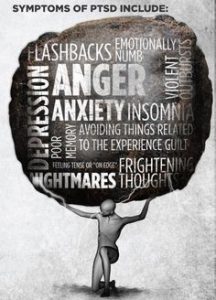It’s not about what is wrong with you. It is about what happened to you.

Post-traumatic stress disorder (PTSD), that thing that you hear about whenever people mention veterans. While veterans brought PTSD to the public’s attention it affects more than just them, 7.7 million American adults are reported to be affected by PTSD. Described by the National Institute of Mental Health PTSD is “a disorder that develops in some people who have experienced a shocking, scary, or dangerous event… who continue to experience problems [from the trauma]; [they] may feel stressed or frightened even when they are not in danger.” It can happen to anyone, at any age, and from any traumatic experience. This experience can be at an individual level or second hand from the experience of a loved one.
 Not everyone who faces traumatic experiences will live with PTSD. Many factors play a role in this memory formation, stress is simply an amplifier. The more stress the stronger the memory, evoking a long-lasting impact on behaviors. This memory is consolidated in the hippocampus to cause appropriate behaviors during repeating events. These responses are due to the glucocorticoid receptors. Glucocorticoids are stress hormones, secreted in the adrenal cortex from cholesterol activates specific brain regions (hippocampus, amygdala, and prefrontal cortex) saturated in their receptors. The receptors are crucial in encoding, processing, and retaining the information of emotional events. The level of stress determines the response and it can cause long-term changes such as memory formation of these stress inducing experiences.
Not everyone who faces traumatic experiences will live with PTSD. Many factors play a role in this memory formation, stress is simply an amplifier. The more stress the stronger the memory, evoking a long-lasting impact on behaviors. This memory is consolidated in the hippocampus to cause appropriate behaviors during repeating events. These responses are due to the glucocorticoid receptors. Glucocorticoids are stress hormones, secreted in the adrenal cortex from cholesterol activates specific brain regions (hippocampus, amygdala, and prefrontal cortex) saturated in their receptors. The receptors are crucial in encoding, processing, and retaining the information of emotional events. The level of stress determines the response and it can cause long-term changes such as memory formation of these stress inducing experiences.
The increase in the glucocorticoid receptors (GR) generates a new cascade response. The GR in the dentae gyrus (DG) neurons are involved in phosphorylation of S10 and the acetylation of K14 of histone H3 within the fos and erg1 gene promoter regions. This allows for the DNA to open and encode these silent (normally turned off) genes. fos and erg1 are immediate-early genes (IEG) that play a role in learning and memory processing, specifically consolidation of long-term memory, when triggered by external stimuli.
These are not the only mechanisms involved, however they are very influential. Other findings include the gender discrepancy, where women are more likely to develop PTSD and PTSD’s linkage to mild to moderate traumatic brain injury as seen in many veterans.

Not everyone will have PTSD in their life, some may even get over it sooner than others. Triggers are common and if you know someone with PTSD, help them whether it is by being someone to talk to or helping them avoid triggers. One day we may be able to prevent it but until then we need to understand it and help our fellow humans. As someone who has suffered from it personally and who has family members with it, the best thing to do is take them seriously and don’t degrade them or their experience when they share the feelings they are having.
